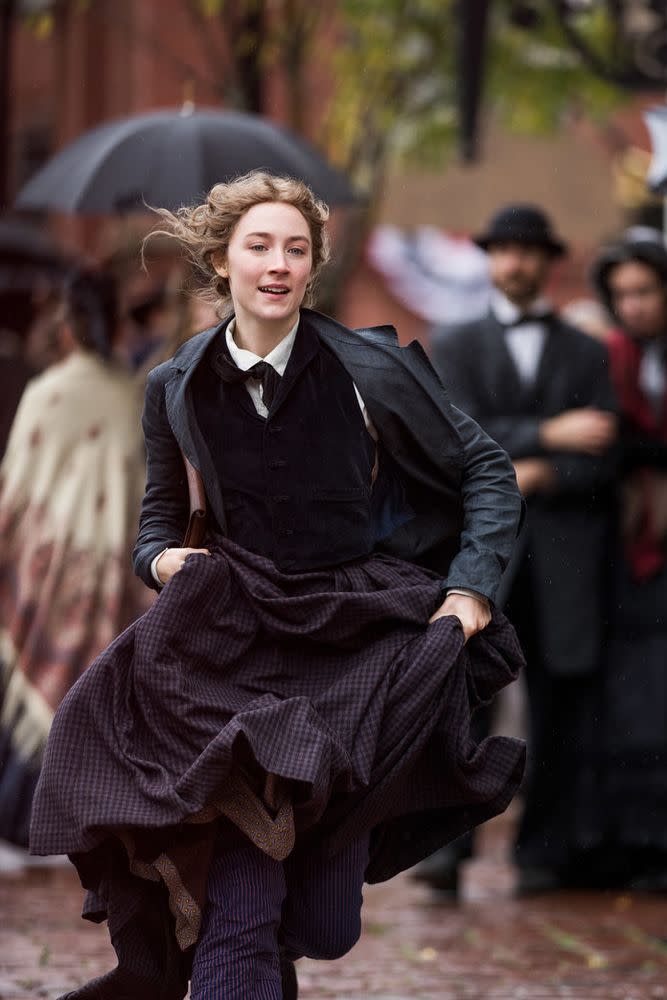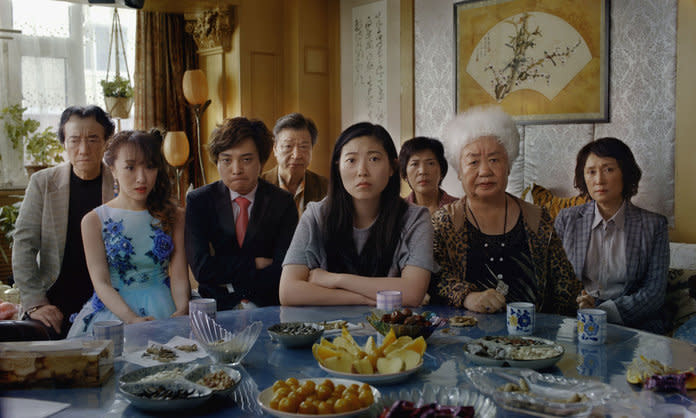The Reason Women Were Snubbed at the Oscars Is Really Obvious
Mondays are hard enough without discovering that the Academy of Motion Picture Arts and Sciences straight up forgot about women.
The 2020 Oscar nominations were announced earlier this week, and once again, women and stories about women were omitted in favor of “traditional Oscar” bait. But who is being baited?
The Academy — with its membership that’s 68% male and 84% white — only chooses to reward those films that feel comfortable, familiar. Basically, the stories of men, the stories that let them go on living in their particular bubble, are the stories that succeed.
Jo March, speaking the words written for her by Greta Gerwig, perhaps said it best: “I just feel like women, they have minds and they have souls, as well as just hearts. And they’ve got ambition and they’ve got talent, as well as just beauty. And I’m so sick of people saying that love is all a woman is fit for!”
Women are more — more than the sum of their relationships to the men in their lives, more than daughters and wives and mothers. Of course, they always have been. But the Oscars, still held as the singular highest artistic achievement in cinema, have failed to see them.

When women tell stories about complicated women, their work is othered, and categorized to death: Is The Farewell actually a foregin language film? Is Hustlers too risque for the Academy’s buttoned-up taste? The answers are no and no, but such films are still ultimately left out of the conversation. When men tell stories about complicated men, they are lauded as brilliant metaphors for society, the “genius” works of our time. We need another film about war; and another Joker; and another mob movie; and another deep dive into Hollywood’s own backyard — the part of it where the aging men hang out.
We aren’t surprised, but the disappointment still stings. OK, maybe we had gotten our hopes up when industry experts dangled names like Jennifer Lopez, Awkwafina, and Lupita Nyong’o in front of us — names of actresses who starred in the 2019 films that told powerful stories about powerful women. We allowed ourselves a puny kernel of hope that this time would not be like every other time. And yet.
What men are comfortable with may well be the litmus test for Oscar worthiness.
And what roles are men comfortable with women inhabiting? The aforementioned mothers, sisters, wives, daughters. Once again, the Academy has granted permission to reward those roles. Scarlett Johansson was nominated for Best Lead Actress for Marriage Story and Best Supporting Actress for Jojo Rabbit, and in both films, her character is dependent on her relationships to men, as a scorned wife and then the mother of a young, imaginative boy. The same goes for surprise nominee Kathy Bates, who played the tortured mother of the titular Richard Jewell. It should also be said that aside from Cynthia Erivo, every other female actress nominee is white, blonde, and at some point in their lives could have played Marilyn Monroe.
But a real-life story about strippers seeking revenge on the finance tycoons that screwed them (and the rest of the economy) during the great recession? Nah, no thank you. An upper middle class black woman flirting with the paranormal? Pass.
The most-nominated movies of 2020 include Joker, The Irishman, 1917, and Once Upon a Time in Hollywood, with 41 nominations between them. No women were nominated for acting in any of these films. Because they are men’s stories. The women, as it seems the Academy prefers, are decoration.
Awkwafina, who took home the Best Actress Golden Globe not two weeks ago, was denied a nomination for the Oscars, but perhaps it was a longshot to think that the Academy could see Lulu Wang’s The Farewell as an American story when it doesn’t literally take place in America. A complicated narrative about a first-generation American woman whose family chooses not to tell their grandmother about her terminal cancer diagnosis on the basis of cultural customs? A mob movie is a safer bet. More relatable.

“There were amazing performances this year,” Awkwafina said of the nominations on Tuesday. “They are all warranted as they should have been. But we can’t ignore movies that women helmed, including mine.”
And then, of course, there’s Gerwig, who was left out of the Best Director category, despite the fact that the film she wrote and directed achieved nominations for Best Picture, Best Leading and Supporting Actresses, Best Adapted Screenplay, Best Score, and Best Costume Design — all of which were coordinated by who? Oh yes, Greta.
“I feel like if you’ve been nominated for Best Picture, you have essentially been nominated for Best Director,” Saorise Ronan, Little Women’s own Jo March, told Deadline of Greta’s snub. So why leave Greta out? Could it be that maybe men don’t feel comfortable with women in power? Please hold while I dial Elizabeth Warren to find out.
RELATED: Jennifer Lopez's Oscars Snub Is Frustrating, but Not Surprising
In 2019, the Academy added over 800 members, and touted record numbers of women and people of color, a pointed response to the hashtags that for five years now have called the Academy on its monochrome makeup. But change takes time.
...I would never consider diversity in matters of art. Only quality. It seems to me that to do otherwise would be wrong.
— Stephen King (@StephenKing) January 14, 2020
According to the LA Times, “many male Academy voters” made the choice not to see Little Women, which means they have little in common with the hundreds of thousands who went to theaters during the film’s opening weekend, where it grossed almost $17 million. If the Academy won’t even go see the film, then how can we expect the Oscar nominations to reflect the accomplishments of women in film?
It’s not all doom and gloom and internal moral conflict about Stephen King, though. The truth is, more films are being made that tell women’s stories and immigrant stories and international stories — and those stories have been succeeding despite a disappointing lack of acknowledgments this awards cycle.
Women have been creating the kind of work that urges audiences to ask uncomfortable questions about ourselves, our morals, our cultural blind spots. If some audiences aren’t comfortable stretching and growing along with the culture being created for us, perhaps it’s time they get left behind rather than the other way around.

